External links
| International | |
|---|---|
| National | |
| Other | |
| | This article about a classical composition is a stub. You can help Wikipedia by expanding it. |
Nisi Dominus is a setting of the Latin text of Psalm 127 (Vulgate 126) by George Friederic Handel. The name of the piece comes from the first two words (the incipit ) of the psalm, and it is catalogued in the composer's complete works as HWV 238. It was completed by 13 July 1707, and is one of a number of works he composed in Italy. It is most likely that Nisi Dominus was first performed on 16 July 1707 in the church of Santa Maria in Montesanto, Rome, under the patronage of the Colonna family.
In the concluding doxology, Handel writes for eight voices in a double chorus and (uniquely in his output) a double string orchestra.
A typical performance lasts almost 12 minutes.
The work has the following movements:
| Movement | Type and voice | Text | Translation |
|---|---|---|---|
| 1 | Soloists and Chorus | Nisi Dominus aedificaverit domum, in vanum laboraverunt, qui aedificant eam. Nisi Dominus custodierit civitatem, frustra vigilat, qui custodit eam. | Except the Lord build the house: their labour is but lost that build it Except the Lord keep the city: the watchman waketh but in vain. |
| 2 | Aria (Tenor solo) | Vanum est vobis ante lucem surgere: surgite, post quam sederitis, qui manducatis panem doloris. | It is but lost labour that ye haste to rise up early, and so late take rest, and eat the bread of carefulness. |
| 3 | Aria (Countertenor solo) | Cum dederit dilectis suis somnum. Ecce haereditas Domini filii, merces fructus ventris. | For so he giveth his beloved sleep. Lo, children and the fruit of the womb: are an heritage and gift that cometh of the Lord. |
| 4 | Aria (Bass solo) | Sicut sagittae in manu potentis ita filii excussorum. | Like as the arrows in the hand of the giant: even so are the young children. |
| 5 | Aria (Tenor solo) | Beatus vir qui implevit desiderium suum ex ipsis: non confundetur cum loquetur inimicis suis in porta. | Happy is the man that hath his quiver full of them: they shall not be ashamed when they speak with their enemies in the gate. |
| 6 | Double Chorus | Gloria Patri et Filio, Spiritui Sancto. Sicut erat in principio, et nunc, et semper, et in saecula saeculorum. Amen | Glory be to the Father, and to the Son, and to the Holy Ghost: As it was in the beginning is now, and ever shall be: world without end. Amen. |
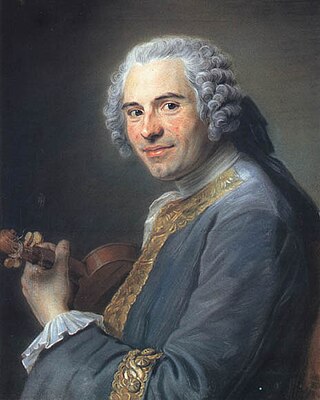
Jean-Joseph de Mondonville, also known as Jean-Joseph Cassanéa de Mondonville, was a French violinist and composer. He was a younger contemporary of Jean-Philippe Rameau and enjoyed great success in his day. Pierre-Louis Daquin claimed, "If I couldn't be Rameau, there's no one I would rather be than Mondonville".
Dixit may refer to:

Psalm 69 is the 69th psalm of the Book of Psalms, beginning in English in the King James Version: "Save me, O God; for the waters are come in unto my soul". It is subtitled: "To the chief musician, upon Shoshannim, a Psalm of David". The Book of Psalms is part of the third section of the Hebrew Bible, and a book of the Christian Old Testament. In the slightly different numbering system used in the Greek Septuagint version of the Bible and in the Latin Vulgate, this psalm is Psalm 68. In Latin, it is known as "Salvum me fac Deus". It has 36 verses.
Dixit Dominus is a psalm setting by George Frideric Handel. It uses the Latin text of Psalm 110, which begins with the words Dixit Dominus.
Salve Regina is an antiphon composed by George Friederic Handel around 1707. It is most likely that the work was first performed for Trinity Sunday in Vignanello on 19 July 1707 in the Church of Santa Maria in Montesanto, under the patronage of the Colonna family. Other catalogues of Handel's music have referred to the work as HG xxxviii, 136.

Redhouse Castle is a ruined tower house castle, 2 km east of Longniddry, East Lothian, Scotland, UK, on the B1377, close to Spittal. The castle designated as a scheduled monument. It is no longer protected as a category A listed building.

The City Tower is one of the most important historic monuments of Trnava, Slovakia.
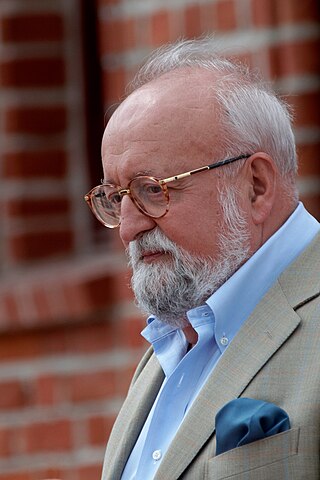
Krzysztof Penderecki wrote his Seventh Symphony, subtitled "Seven Gates of Jerusalem", in 1996 to commemorate the third millennium of the city of Jerusalem. Originally conceived as an oratorio, this choral symphony was premièred in Jerusalem in January 1997; it was only after the first Polish performance two months later that Penderecki decided to call it a symphony. It is written for two sopranos, alto, tenor, bass, narrator, chorus and orchestra.

Psalm 126 is the 126th psalm of the Book of Psalms, beginning in English in the King James Version: "When the Lord turned again the captivity of Zion, we were like them that dream". In Latin, it is known as In convertendo Dominus. It is one of the fifteen Songs of Ascent in the Book of Psalms whose opening words in Hebrew are "Shir HaMaalot". In the slightly different numbering system used in the Greek Septuagint version of the Bible and in the Latin Vulgate, this psalm is Psalm 125.
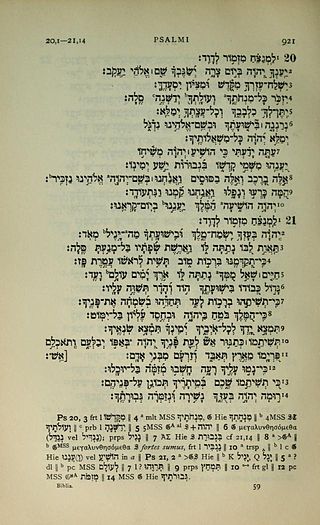
Psalm 20 is the 20th psalm of the Book of Psalms, beginning in English in the King James Version: "The LORD hear thee in the day of trouble". The Book of Psalms is part of the third section of the Hebrew Bible, and a book of the Christian Old Testament. In the slightly different numbering system used in the Greek Septuagint and Latin Vulgate translations of the Bible, this psalm is Psalm 19. In Latin, it is known by the incipit, "Exaudiat te Dominus". The psalm is attributed to David. This psalm and the following one are closely related: they are both liturgical psalms: the first is an intercession, the second is a thanksgiving; in both, the king is the prominent figure.

Psalm 93 is the 93rd psalm of the Book of Psalms, beginning in English in the King James Version: "The LORD reigneth, he is clothed with majesty". The Latin wording is Dominus regnavit, decorem indutus est. The Book of Psalms is part of the Hebrew Bible and the Christian Old Testament. In the slightly different numbering system of the Greek Septuagint and Latin Vulgate versions of the Bible, this psalm is Psalm 92. It is the first of a series of psalms which are called royal psalms as they praise God as King.
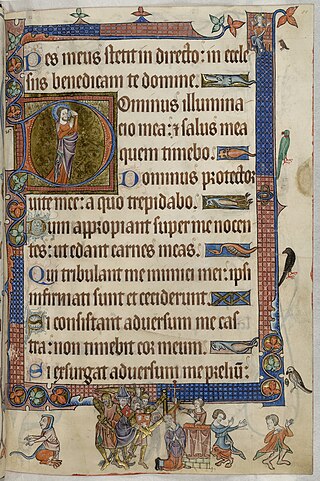
Psalm 27 is the 27th psalm of the Book of Psalms, beginning in English in the King James Version: "The LORD is my light and my salvation; whom shall I fear?". The Book of Psalms is part of the third section of the Hebrew Bible, and a book of the Christian Old Testament. In the slightly different numbering system used in the Greek Septuagint and Latin Vulgate translations of the Bible, this psalm is Psalm 26. In Latin, it is known as "Dominus illuminatio mea".

Psalm 124 is the 124th psalm of the Book of Psalms, beginning in the English of the King James Version: "If it had not been the LORD who was on our side, now may Israel say". The Book of Psalms is part of the third section of the Hebrew Bible, and a book of the Christian Old Testament. In Latin it is known as "Nisi quia Dominus". It is one of fifteen psalms that begin with the words "A song of ascents". Using "conventional metaphors", it recalls the dangers faced by Israel from which the nation has been rescued.

Psalm 48 is the 48th psalm of the Book of Psalms, beginning in English in the King James Version: "Great is the LORD, and greatly to be praised in the city of our God". In the slightly different numbering system used in the Greek Septuagint version of the bible, and generally in its Latin translations, this psalm is Psalm 47. In the Vulgate, it begins "Magnus Dominus". The psalm was composed by the sons of Korah, as "a celebration of the security of Zion", In its heading it is referred to as both a "song" and a "psalm".
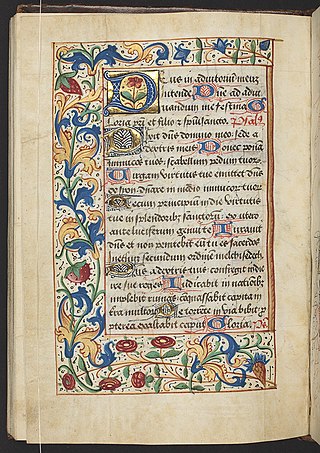
Psalm 110 is the 110th psalm of the Book of Psalms, beginning in English in the King James Version: "The LORD said unto my Lord". In Latin, it is known as Dixit Dominus. It is considered both a royal psalm and a messianic psalm. C. S. Rodd associates it with the king's coronation. In the slightly different numbering system used in the Greek Septuagint and Latin Vulgate translations of the Bible, this psalm is Psalm 109.

Psalm 113 is the 113th psalm of the Book of Psalms, beginning in English in the King James Version: "Praise ye the Lord, O ye servants of the Lord". The Book of Psalms is part of the third section of the Hebrew Bible, and a book of the Christian Old Testament. In Latin, it is known as 'Laudate pueri Dominum.

Psalm 127 is the 127th psalm of the Book of Psalms, beginning in English in the King James Version: "Except the Lord build the house". In Latin, it is known by the incipit of its first 2 words, "Nisi Dominus". It is one of 15 "Songs of Ascents" and the only one among them attributed to Solomon rather than David.

George Frideric Handel's Gloria is a sacred solo cantata, a setting of the Gloria, the liturgical part of the Mass, for soprano and strings. Handel may have composed it in Germany before departing for Italy in 1706. The composition was lost for many years and was attributed to Handel again only in 2001.

Antonio Vivaldi composed three settings of the Dixit Dominus, the Latin version of Psalm 110. They include a setting in ten movements for five soloists, double choir and orchestra, RV 594, another setting in eleven movements for five voices, five-part choir and orchestra, RV 595, and a recently discovered setting in eleven movements for five soloists, choir and orchestra, RV 807, which had been attributed to Baldassare Galuppi. It is said to be one of his "most significant sacred works."

Chandos Anthems, HWV 246–256, is the common name of a set of anthems written by George Frideric Handel. These sacred choral compositions number eleven; a twelfth of disputed authorship is not considered here. The texts are psalms and combined psalm verses in English. Handel wrote the anthems as composer in residence at Cannons, the court of James Brydges, who became the First Duke of Chandos in 1719. His chapel was not yet finished, and services were therefore held at St Lawrence in Whitchurch. The scoring is intimate, in keeping with the possibilities there. Some of the anthems rely on earlier works, and some were later revised for other purposes.